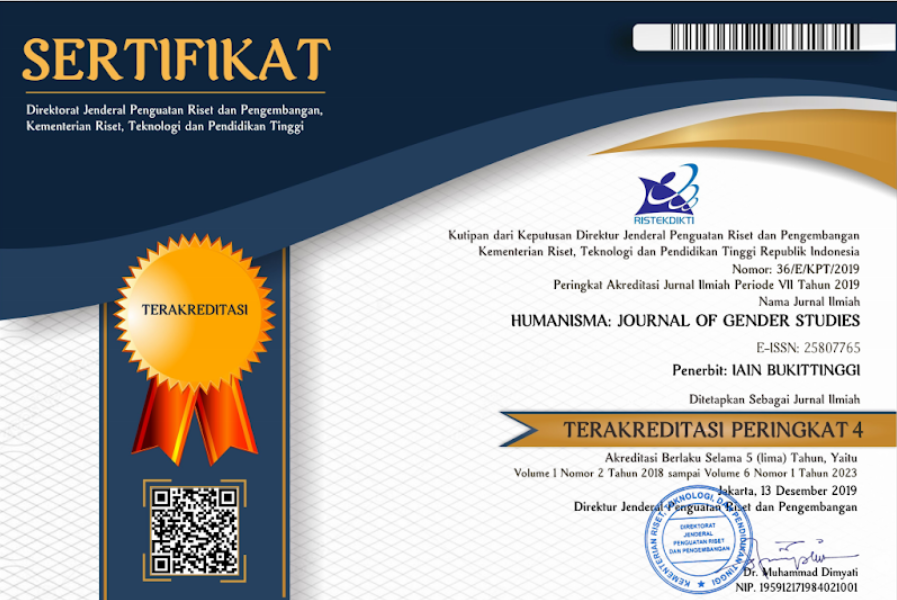Pemberdayaan Tulis Baca Al-Quran untuk Anak Asuh Perempuan Marginal di Panti Sosial Bina Remaja Harapan Padang Panjang
DOI:
https://doi.org/10.30983/humanisme.v4i1.3326Keywords:
Read Write the Quran, Foster Care, Marginal WomenAbstract
The purpose of this essay will want to see about the social homes member to keep having role to play in spiritual development to all boys and girls have been displaced. Little understanding spiritual minirities which were represented by the son of the daycare centers indirectly has a meseareble effect on the quality of the development of human resources. The problem of the most fundamental level the most striking difference for that currently the population in its rates will be they from the people of religius on understanding of, be specific about the level of knowledege of have read many times before Al-quran prescribed in the book. In order to overcome problems it was to know the team devotion is attemping to perform identification to doing mapping the real problems going on. This target is to come up with those of a solution and a replay to its problems that they natural, so that found a methode of and strategies right moment in of redutcing the incidence of on problem currently they have to deal with. Technically there are two the stage in which it is offred by researcheared, and promised to supply: pre-activities through FGD and acctivities the action of through the training reading and writing skills Al-quran. The firs phase: pre different activities FGD illustrate that it is playing one person various informants. The second phase: activities are to be implemented the action of in the forrm of skills training level playing field wrote never so much as read Al-quran illustrated that it is playing two people the source of information in accordance their skills. This activity has been iniciated designed throgh a strategy of ekspository and cooperative learning.
References
Daftar Pustaka
Abdur Rauf, dkk (2012). Anda pun
Bisa Menjadi Hafidz AlQuran.Jakarta: Markas Quran.
Afrinaldi, dkk, (2016). Pelaksanaan Layanan Konseling Berbasis Spiritual (Pendekatan Community Based Research (CBR) di PSBR Harapan Padang Panjang) Bagi Anak Panti Perempuan Marginal. (Proceeding Annual International Conference on Islamic Studies (AICIS) ke 16, 1- 4 November). Kerjasama UIN Raden Intan Lampung dengan DIKTIS KEMENAG RI.
-------------, dkk, (2015). Optimalisasi Tujuan dan Fungsi Panti Sosial Bina Remaja Harapan Padang Panjang Untuk Meningkatkan Keterampilan Psikologis dan Keberagamaan Anak Panti yang Termarginalkan. Program Pengabdian Masyarakat Kompetitif DIKTIS KEMENAG RI (Laporan: Tidak diterbitkan).
-------------, (2011). Pengembangan Qalbu (Hati) Melalui Pendekatan Kecerdasan Spiritual dan Kecerdasan Ruhaniah. Bukittinggi: Jurnal Analisa.
Anasril, dkk. 2015. Profil PSBR Harapan Padang Panjang, (tidak diterbitkan, Padang panjang).
Annuri, Ahmad. (2007). Panduan Tahsin dan Tilawah Al Quran & Pembahasan Ilmu Tajwid. Bogor: Prim Publishing.
Ary Ginanjar Agustian, (2001). Rahasia Sukses Membangun Kecerdasan Emosi dan Spiritual. Jakarta: Arga,.
Djaluddin. (2012). Cepat Membaca AlQuran dengan Metode Tunjuk Silang.Jakarta: Kalam Mulia.
Ermawati, Wawancara Pribadi 05 Maret 2018 di PSBR Harapan Padang Panjang.
Haidar Alwasilah, (2011). Metodologi Pembelajaran Bahasa Arab, Bandung: PT Remaja Rosdakarya.
Jalaluddin. (2009). Psikologi Agama. Jakarta: PT Raja Grafindo Persada.
Mustaidah, (2016). Upaya Meningkatkan Kemampuan Baca Tulis Alquran dengan Menggunakan Metode Yanbu’a. Jurnal of Islamic Culture and Education Volume 1 No 1, Juni.
M. Quraish Shihab, (2001) Lentera Hati, Bandung: Mizan.
Rini Astuti, (2013). Peningkatan Kemampuan Membaca Al-quran Pada Anak Detention Deficit Disorder Melalui Metode Al-Barqy Berbasis Aplied Behavior Analysis. Jurnal Pendidikan Usia Dini, Volume 7 Edisi 2, November.
Toto Tasmara, (2001). Kecerdasan Ruhaniah. Jakarta: Gema Insani Press.
Downloads
Published
How to Cite
Issue
Section
Citation Check
License
Authors who publish with this journal agree to the following terms:
- Authors retain copyright and grant the journal right of first publication with the work simultaneously licensed under a Creative Commons Attribution-ShareAlike 4.0. that allows others to share the work with an acknowledgment of the work's authorship and initial publication in this journal.
- Authors are able to enter into separate, additional contractual arrangements for the non-exclusive distribution of the journal's published version of the work (e.g., post it to an institutional repository or publish it in a book), with an acknowledgment of its initial publication in this journal.
- Authors are permitted and encouraged to post their work online (e.g., in institutional repositories or on their website) prior to and during the submission process, as it can lead to productive exchanges, as well as earlier and greater citation of published work (See The Effect of Open Access).



